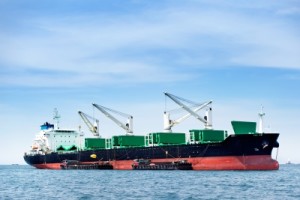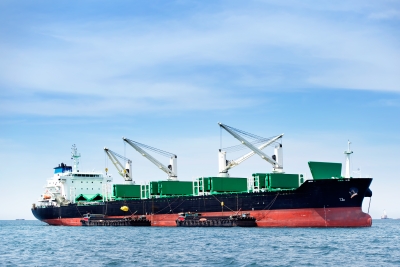 The Maritime Industry Authority (MARINA) is pushing via a draft bill the easing of the Philippines’ cabotage law by allowing foreign flag vessels to call at more than one port in the country without the need for a special permit.
The Maritime Industry Authority (MARINA) is pushing via a draft bill the easing of the Philippines’ cabotage law by allowing foreign flag vessels to call at more than one port in the country without the need for a special permit.
“We are supporting the liberalization of the cabotage law,” MARINA administrator Dr. Maximo Mejia, Jr. said on the sidelines of the recent launching of the agency’s Enhanced Special Processing Window Express Lane
“We are trying to address the specific call of the President in relation to lowering the cost of shipping,” Mejia said, citing that “one of the main problems” is the cost of shipping export and import cargoes.
President Benigno Aquino in his “State of the Nation” address last July urged Congress to amend the cabotage law “to foster greater competition and to lower the cost of transportation for our agricultural sector and other industries.”
However, Mejia acknowledged lifting the law would impinge on “a constitutional provision that protects cabotage… to lift it means to open up the constitutional amendment; I don’t think that’s part of the agenda of the administration.”
A lifting of the law would also mean foreign-flag vessels may enter domestic waters but “not be subject to Philippine taxation law” leading to diminished revenues for domestic shipping operators, a situation that will in turn translate to an uneven playing field.
Unlike foreign carriers, domestic shipping is subject to numerous taxes such as the 12% value-added tax, 12% corporate income tax, and 12% drydocking tax, while foreign shipping lines are only subject to common carriers tax of 3% and gross billings tax of 2.5%.
Mejia said, “killing off the domestic shipping industry is not really in our interest.”
He noted, “What we are pushing for is allowing foreign flag vessels to call at more than one port in the Philippines only for the purpose of carrying import or export cargo.”
Under current MARINA rules, foreign-flag vessels are allowed to call at more than one port if granted a special permit by the authority.
Philippine Ship Agents Association president Virgilio Angeles told PortCalls foreign carriers “welcome this move by MARINA” as it will “level the playing field” and in the long term, is “very good for the economy and it would entice foreign direct investments to pour in.”
MARINA’s draft bill is entitled “An Act Liberalizing Cabotage Rules to Allow Foreign Vessels to Engage in the Carriage of Cargoes in Domestic Ports and for Other Purposes,” or the Cabotage Liberalization Act of 2013.
The bill seeks to liberalize the entry of foreign vessels to assist importers and exporters in enhancing their competitiveness in light of intensifying international trade, and lower the cost of shipping export cargoes to and from the international ports in the country.
Liberalization, under the draft measure, means that the right to engage in carriage of cargoes shall not be limited to vessels carrying a Certificate of Philippine Registry, provided that said cargoes fall within the purview of import or export cargoes.
Foreign vessels would be “allowed to carry cargoes in ports or places within the Philippine territorial waters even when a domestic ship is available or suitable to provide the needed service and public interest warrants.
“Articles arriving from abroad on a foreign vessel may be carried by the same vessel through any port of entry to the port of destination in the Philippines.”
The MARINA, upon a foreign vessel’s compliance with all requirements, may issue a Certificate of Carriage of Import-Export Cargoes.
The clearance is allowed on two instances: when an international cargo vessel shifts empty containers of any foreign line between Philippine ports; and when a foreign liner transships cargo coming from or headed for a foreign port to and from any Philippine port.
The draft bill seeks to repeal Sections 810, 902, and 1009 of the Tariff and Customs Code of the Philippines and Sections 5, 6 and 7 of the Domestic Shipping Development Act of 2004.
In its explanatory note, MARINA said cabotage “limits competition and encourages inefficiency among local vessel operators since foreign vessels are not allowed to call at more than one port for every entry within Philippine territory.
“This prevents foreign vessels from calling at multiple ports for the purpose of either loading export cargoes or discharging import cargoes [which] translates to additional costs for shippers who need to transship their foreign cargoes through one of only a few major ports.
MARINA said passage of the bill would eliminate limitations on carriage of foreign cargoes by foreign vessels in the country; increase port revenues and promote cost-competitiveness among shipping companies; and ensure adequate, efficient and price-competitive shipping service to help Filipino exporters and importers.
Earlier, Philippine Interisland Shipping Association (PISA) president Primo Rivera Rivera said domestic shipping rates are not costlier than foreign shipping rates. Warehousing, trucking, cargo-handling and other processing fees are what add up to the cost of shipping, he said.
A PortCalls source from PISA pointed out that the “liberalization” MARINA is proposing had already been rejected by the National Competitiveness Council. The same draft bill has also been presented to the Senate Committee on Trade and Commerce led by Sen. Paolo Benigno “Bam” Aquino. ––Roumina M. Pablo





